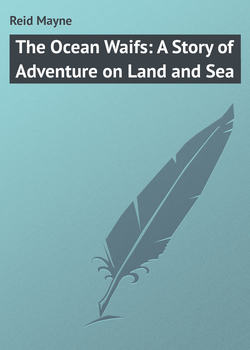Читать книгу The Ocean Waifs: A Story of Adventure on Land and Sea - Reid Mayne - Страница 14
Chapter Fourteen.
A Sail of Shark-Flesh
ОглавлениеIt wanted but a little while of sunset, when the sailor and his young comrade had finished flensing the shark. The raft now exhibited quite an altered appearance. Between the two upright oars several pieces of rope had been stretched transversely, and from these hung suspended the broad thin flitches of the shark’s flesh, that at a distance might have been mistaken for some sort of a sail. Indeed, they acted as such; for their united discs presented a considerable breadth of surface to the breeze, which had sprung up as the evening approached, and the raft by this means moved through the water with considerable rapidity.
There was no effort made to steer it. The idea of reaching land was entirely out of the question. Their only hope of salvation lay in their being seen from a ship; and as a ship was as likely to come from one direction as another, it mattered not to which of the thirty-two points of the compass their raft might be drifting. Yes, it did matter. So thought Ben Brace, on reflection.
It might be of serious consequence, should the raft make way to the westward. Somewhere in that direction – how far neither could guess – that greater raft, with its crew of desperate ruffians, – those drunken would-be cannibals, – must be drifting about, like themselves, at the mercy of winds and waves: perhaps more than themselves suffering the dire extreme of thirst and hunger. Perhaps, ere then, one of their own number may have been forced to submit to the horrid fate which they had designed for little William; and which, but for the interference of his generous protector, would most certainly have befallen him.
Should he again fall into their clutches, there would be but slight chance of a second escape. His protector knew that. Ben knew, moreover, that his own life would be equally sure of being sacrificed to the resentment of the ribald crew, with whom he had formerly associated.
No wonder, as he felt the breeze blowing on his cheek, that he looked towards the setting sun, to ascertain in what direction the raft was being borne. No wonder that his anxious glance became changed to a look of satisfaction when he perceived that they were moving eastward.
“To the east’ard it are, sure enough,” said he, “and that be curious too. ’T an’t often I’ve see’d the wind blow from the westward in these latitudes. Only another catspaw in the middle o’ the calm. ’T won’t last long; though it won’t matter, so long’s it don’t turn and blow us t’other way.”
The expressed wish not to be blown “t’other way” needed no explanation. William understood what that meant. The fearful scene of the preceding day was fresh in his memory. That scene, where half a score of fiend-like monsters, threatening his life, were kept at bay by one heroic man, – that was a tableau too terrible to be soon forgotten.
Nor had he forgotten it, even for a moment. Perhaps, during that brief conflict with the sharks, the nearer danger may have driven it for an interval out of his mind; but that over, the dread remembrance returned again; and every now and then, – even while engaged in the varied labours that had occupied them throughout the day, – in a sort of waking dream he had recalled that fearful vision. Often – every few minutes in fact – had his eyes been turned involuntarily towards the west, – where, instead of looking hopefully for a ship, his anxious glance betrayed a fear that any dark object might be seen in that direction.
On finishing their task, both were sufficiently fatigued, – the strong sailor as well as his feebler companion. The former still kept his feet, anxiously scanning the horizon; while the latter laid himself along the bare boards of the raft.
“Little Will’m,” said the sailor, looking down at the boy, and speaking in gentle tones, “you’d better spread the sail under ye, and get some sleep. There be no use in both o’ us keeping awake. I’ll watch till it gets dark, an’ then I’ll join you. Go to sleep, lad! go to sleep!”
William was too wearied to make objection. Drawing the skirt of the sail over the raft, he lay down upon it, and found sleep almost as soon is he had composed himself into the attitude to enjoy it.
The sailor remained standing erect; now sweeping the horizon with his glance, now bending his eye restlessly upon the water as it rippled along the edge of the raft, and again returning to that distant scrutiny, – so oft repeated, so oft unrewarded.
Thus occupied, he passed the interval of twilight, – short in these latitudes; nor did he terminate his vigil until darkness had descended upon the deep.
It promised to be a dark, moonless night. Only a few feebly gleaming stars, thinly scattered over the firmament, enabled him to distinguish the canopy of the sky from the waste of waters that surrounded him. Even a ship under full spread of canvas could not have been seen, though passing at a cable’s length from the raft.
It was idle to continue the dreary vigil; and having arrived at this conviction, the sailor stretched himself alongside his slumbering companion, and, like the latter, was soon relieved from his long-protracted anxiety by the sweet oblivion of sleep.
